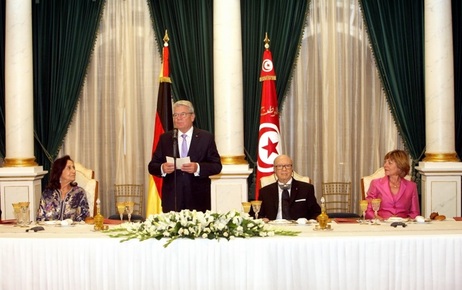I have been in your beautiful country for hardly eight hours, but already I feel very welcome here. Thank you for the warm reception you have given to Daniela Schadt, my delegation and myself. We are delighted to be in Tunis. We are visiting friends, and we are glad to be doing so!
Mr President, your invitation means a great deal to me. It is now over four years since Tunisia, through the Arab Spring, showed the world: We want change. We will invest a huge amount of effort in achieving it. And above all: We want to bring it about by peaceful means.
Since then you have covered a remarkable distance on the path towards democracy and the rule of law, conducted two elections and adopted a constitution. And you have shown great strength. I am thinking of the time when a few weeks ago – on 18 March – terrorists perpetrated a cowardly attack in an attempt to shake your country’s confidence.
In Germany this date, 18 March, is particularly important. In my home country, this date stands for a long tradition of freedom stretching back to 1793, when the Rhenish German National Convention proclaimed a small area of land in Germany a free and independent state.
That was a first on German territory! Later, 18 March 1848 became a significant date of the revolution for freedom and democracy in Germany. And for many East Germans, including for me personally, 18 March 1990 proved to be a very special date. On this day the first free elections for the People’s Chamber of the German Democratic Republic took place in the part of Germany in which I then lived. Those were the first free elections I had experienced – and I was 50 years old. Soon afterwards, German unification became a reality.
From now on, when looking back with thankfulness to 18 March, I will also remember the determined Tunisians who declared on this very day in 2015: We will not allow fanatics to rob us of our freedom! I respect this attitude enormously, and I know that my fellow Germans do, too.
We can sense at all kinds of levels that Tunisian German relations are closer and more intensive than they have ever been. The high number of reciprocal visits has increased considerably since 2011. Our governments, parliaments and civil societies have rediscovered one another and have shown great mutual understanding, esteem and goodwill. Partnerships and, indeed, friendships have developed.
One of these new bridges has a particularly appropriate name: transformation partnership. In this context alone more than 150 projects have been implemented since 2012 – in fields such as vocational training and employment, democracy and human rights, promotion of civil society, the media, in education and the university sector. I am delighted to be able to inform you that the Federal Government has made funds available to allow this transformation partnership to continue until 2017.
Traditional development cooperation is to continue alongside this. Its annual volume has quadrupled since the revolution – for good reason, as you know. All infrastructure established in Tunisia is also an investment in the country’s democratic development. Its people’s quality of life is measured not only in freedom but also in such important categories as security, welfare and prosperity. There is no question that what Tunisia now needs is very targeted economic investment. Your Government’s plans to better integrate Tunisia in the global economy and to boost your country’s value added is something I wholeheartedly support.
I am very eager for Germany to do its part to advance this process. This will be one of the main topics of my visit. I don’t want to pre empt that. However, I believe it is important to say today that this is not about charity or paternalistic concepts. The goal is to recognise Tunisia’s strengths and to tap their potential for economic cooperation. Your country is a fertile land for investment. Take agriculture, for example, in future perhaps in the particularly high quality organic sector. Or think of the idea that Tunisia’s sun could be put to use, not only to shine for tourists from all over the world, but also for the photovoltaics sector.
Tunisia has not played all its cards yet by a long stretch. One of its biggest trumps is undoubtedly the school and higher education system, which is known to be open to both sexes, something which cannot be taken for granted in the Arab world. The industrial base can benefit from this. Its skilled workforce in particular makes Tunisia attractive to domestic and foreign investors in sectors such as textiles, car accessories and electronics. German business recognised this at an early stage and has had a presence in Tunisia for decades, to the advantage of both countries. It is no coincidence that during the times of upheaval over the past few years, which have not always been easy, not one major German enterprise has turned its back on Tunisia. The facts speak for themselves. Around 250 German companies employ more than 55,000 people here. German business clearly has great confidence in Tunisia.
I will say more about confidence – particularly in times of transformation – tomorrow at the Bertelsmann Foundation conference. Then we will have time to examine the many facets of this topic and discuss Tunisian and German experiences. There will also be opportunity to share ideas for new projects.
I would now like you to join me in raising your glasses to this pleasing prospect, to our common values and projects, to President Essebsi, his wife and to the good relations between our countries! Long live the German Tunisian friendship!


